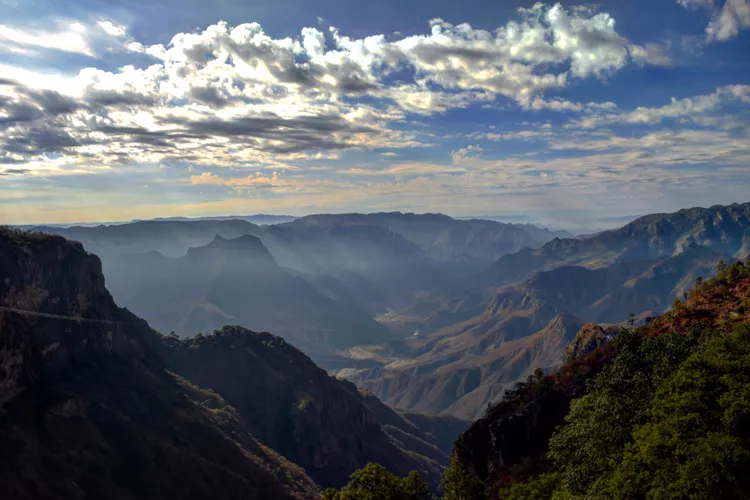Summary
Copper Canyon: A Stunning Destination in Mexico
You can enjoy some of the most rugged and stunning scenery in Mexico in the Copper Canyon, which gets its name from the coppery-green color of the canyon walls. It’s also an excellent destination for adventure activities and nature observation. This canyon, located in the northern Mexican state of Chihuahua, consists of a network of six canyons in the Sierra Madre Occidental mountain range. Consequently, they are several times larger than the Grand Canyon in Arizona. The canyons were formed by six rivers that drain off the western side of the Sierra Tarahumara, then merge into the Rio Fuerte and ultimately empty into the Gulf of California.
Canyon Biodiversity
The canyon’s wide variation in elevation results in two distinct climatic zones: sub-tropical forests in the valleys and a cooler alpine climate in the pine and oak forests of the highlands. The varied topography combined with these climatic conditions has resulted in impressive biodiversity. Approximately twenty-three species of pine and two hundred species of oak trees thrive in the region. Moreover, wild animals such as black bears, pumas, otters, and white-tailed deer call this area home. The canyons are also inhabited by over 300 species of birds, with many more migratory species visiting during the winter months.
The Tarahumara
The area is the homeland of four distinct indigenous groups, with the largest being the Tarahumara, or Rarámuri, numbering about 50,000. They continue to preserve a way of life that has survived through time. Many Rarámuri inhabit the cooler, mountainous regions during the hot summer months and migrate deeper into the canyons during the cooler winter months, where the climate is milder. Consequently, some reside in natural shelters such as caves or small wood or stone cabins. They are renowned for their long-distance running capabilities; indeed, their name, Rarámuri, translates to “those who run fast.” Some Tarahumara artisans sell handcrafted baskets and other items to tourists to help support their families.

Copper Canyon Railway
The most popular way to explore the Copper Canyon is on the Chihuahua al Pacifico Railway, affectionately known as “El Chepe.” Notably, it is virtually the only long-distance passenger train in Mexico that remains operational. This train runs daily along Mexico’s most scenic railway route between Los Mochis, Sinaloa, and the city of Chihuahua. The journey takes between 14 and 16 hours, covering over 400 miles and climbing 8,000 feet into the Sierra Tarahumara, traversing 36 bridges and passing through 87 tunnels. Construction on the railway began in 1898 and concluded in 1961, making this route one of the world’s most remarkable train journeys.
Highlights
The Basaseachic Waterfall, standing at 246 meters high, is the second highest waterfall in Mexico. It’s surrounded by pine forests and offers hiking paths with stunning views of both the falls and the Barranca de Candameña.
Accommodations
Adventure Activities in the Copper Canyon
Adventure tourists can explore the natural beauty of the canyons on foot, by mountain bike, or on horseback. Those interested in these activities should maintain excellent physical fitness, especially considering the altitude and distances involved. It’s advisable to make arrangements with a reputable tour company ahead of your trip and be prepared for an intense, yet awe-inspiring experience.
Copper Canyon Tour Companies
- Amigo Trails creates custom itineraries for exploring the Copper Canyon.
- Canyon Travel offers “soft adventures” and full-day guided hikes, along with a unique experience of riding the train in a private rail car with an open deck.
- Wilderness Adventures in the Copper Canyon provide immersive experiences.
Tips
- Try to plan your trip for the Fall or Spring to avoid temperature extremes.
- Ride the train from the Pacific towards Chihuahua; traveling the opposite direction may cause you to miss some of the most beautiful scenery, which can be seen only during daylight.
- Instead of starting the journey in Los Mochis, consider beginning in El Fuerte, the train’s first stop. This colonial town allows you to board the train an hour later (7 am instead of a 6 am start from Los Mochis).





